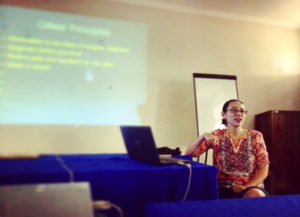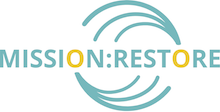
Dr. Joyce Aycock lectures during the November surgical training visit in Tanzania.
By Kate McAuliff
In November 2015, Mission: Restore facilitated a surgical training visit in Mwanza, Tanzania. The methodologies we used to train local surgeons there and in our work in other countries globally exemplify what makes Mission: Restore different from your typical health organization.
Between surgical missions, the telemedicine (or Mhealth) aspect of Mission: Restore’s programming serves to connect our surgeon educators and local surgeons, allowing them to consistently introduce and consult on cases, and plan surgical training details. Prior to the November mission, participants in both Tanzania and the U.S. connected through our telemedicine platform to ensure the preparation of all doctors, patients, and equipment, as well as to discuss focus areas of training in order to make the most of the weeklong training in Mwanza.

Collaboration is a touchstone in Mission: Restore’s teaching methodology.
While Mission: Restore focuses on surgeons, there are also interns, general physicians, and nurses who are vital partners in our work and in their respective surgical departments. This is one reason why, during surgical training visits, we connect with them during presentations. These lectures were given on the principles of reconstructive surgery.
A critical component of our methodology are the surgeries themselves. During the November training, the two surgeons educators and two Tanzanian surgeons worked together throughout the process of patient consultation, surgical design, procedures, and recovery instruction. The balance of demonstration and guided practice eventually lead to the acquisition of new skills by the Tanzanian surgeons, who were left with confidence and a few new surgeries they could perform independently.
This training visit was not without its challenges. Prior to the arrival of the surgeon educators, the partner hospital, all of Mwanza, and the entire country of Tanzania were swept up in the storm of presidential elections. These elections had a large impact on the healthcare system, and this came down to impact the mission through the Ministry of Health-run blood bank, which was running at less than full capacity. Fortunately, a last-minute blood drive supported by the families of patients as well as generous hospital staff made the surgeries performed during the visit possible.
Time and time again, we are learning how to work with local surgeons to grow and learn within their context, which includes challenges such as resource shortages and political instability. Through these challenges, Mission: Restore remains committed to these partnerships and empowering surgeons by operating together.

Recent Comments